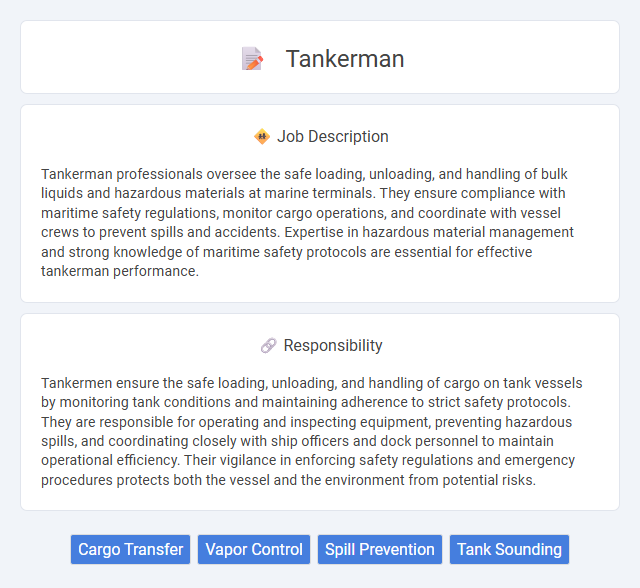
Tankerman professionals oversee the safe loading, unloading, and handling of bulk liquids and hazardous materials at marine terminals. They ensure compliance with maritime safety regulations, monitor cargo operations, and coordinate with vessel crews to prevent spills and accidents. Expertise in hazardous material management and strong knowledge of maritime safety protocols are essential for effective tankerman performance.
Tankerman positions likely suit individuals who can handle physically demanding tasks and work in potentially hazardous environments, requiring strong attention to safety protocols. Candidates with good physical stamina, the ability to stay alert for long periods, and a strict adherence to regulations probably find this role manageable. Those who struggle with high-pressure situations or lack focus on safety might not be well-suited for this job.
Qualification
Tankermen must possess a valid Tankerman Endorsement issued by the U.S. Coast Guard, requiring completion of specific training in handling hazardous liquids and gases. Candidates need comprehensive knowledge of loading, unloading, and securing cargo tanks on vessels, emphasizing safety protocols and emergency response procedures. Physical fitness and excellent communication skills are essential for effective coordination during marine operations and adherence to maritime regulations.
Responsibility
Tankermen ensure the safe loading, unloading, and handling of cargo on tank vessels by monitoring tank conditions and maintaining adherence to strict safety protocols. They are responsible for operating and inspecting equipment, preventing hazardous spills, and coordinating closely with ship officers and dock personnel to maintain operational efficiency. Their vigilance in enforcing safety regulations and emergency procedures protects both the vessel and the environment from potential risks.
Benefit
Working as a tankerman likely offers competitive pay due to the specialized nature of handling hazardous cargo. The position probably provides opportunities for travel and gaining experience in diverse maritime environments, enhancing professional growth. Job stability may be achievable given the ongoing demand for skilled personnel in maritime logistics and safety compliance.
Challenge
The Tankerman job often involves complex coordination and strict adherence to safety protocols, which may present significant challenges in managing hazardous materials. The probability of encountering unexpected situations such as equipment malfunctions or adverse weather conditions could increase operational difficulty. Effective communication and quick decision-making are likely crucial to overcoming these challenges successfully.
Career Advancement
Tankermen play a critical role in marine transportation by overseeing the safe loading, unloading, and handling of cargo tanks on ships and barges. Career advancement opportunities include progressing to supervisory positions such as Tankerman Supervisor, Tankerman PIC (Person In Charge), or transitioning into related maritime roles like deck officer or port operations manager. Obtaining necessary certifications, extensive experience, and specialized training in hazardous materials handling and safety regulations significantly enhances prospects for promotion and higher earnings.
Key Terms
Cargo Transfer
Tankermen specialize in the safe and efficient transfer of cargo liquids such as petroleum, chemicals, and liquefied gases between vessels, storage tanks, and transportation units. They monitor loading and unloading operations, control valves and pumps, and ensure compliance with safety regulations and environmental protocols. Expertise in handling hazardous materials and coordination with ship crews and terminal operators is essential for preventing spills and ensuring smooth cargo transfer processes.
Vapor Control
Tankermen specializing in vapor control ensure safe handling and transfer of hazardous cargoes by minimizing vapor emissions during marine loading and unloading operations. They utilize vapor recovery units and follow stringent safety protocols to prevent atmospheric pollution and protect crew health. Mastery of vapor control techniques significantly reduces environmental impact and regulatory compliance risks in tanker operations.
Spill Prevention
Tankermen play a crucial role in spill prevention by ensuring secure loading and unloading of liquids aboard vessels and barges. They meticulously monitor tank levels, inspect transfer equipment, and adhere to strict safety protocols to prevent leaks and hazardous spills. Their expertise in handling hazardous materials minimizes environmental risks and promotes compliance with maritime pollution regulations.
Tank Sounding
Tankermen specialize in measuring liquid levels in cargo tanks aboard ships, ensuring accurate tank sounding operations for safe loading and unloading. Precise tank sounding prevents overfilling, monitors cargo condition, and supports compliance with maritime safety regulations. Expertise in using manual sound rods and electronic sounding devices is crucial for maintaining accurate cargo measurement and preventing spills.
 kuljobs.com
kuljobs.com